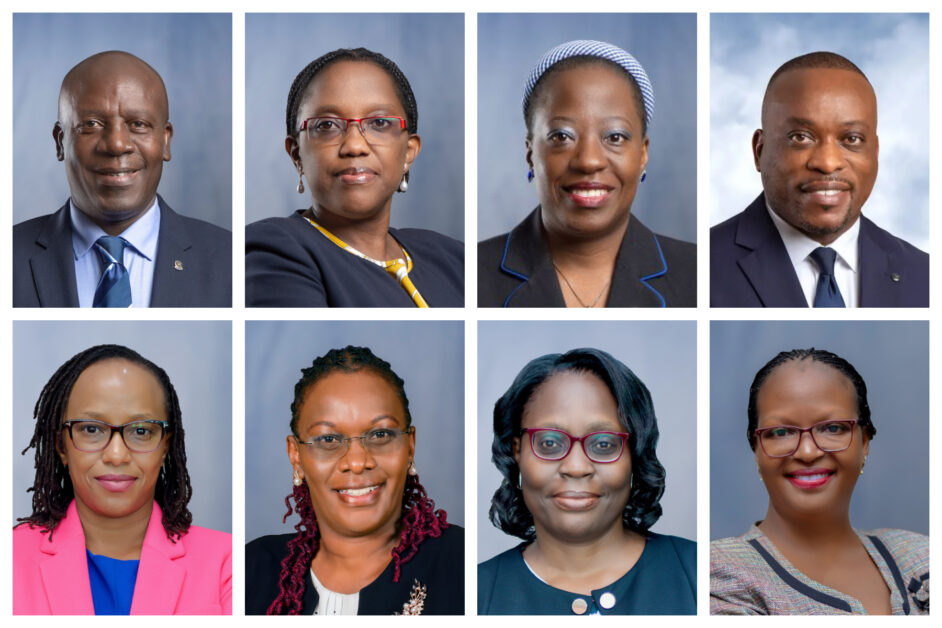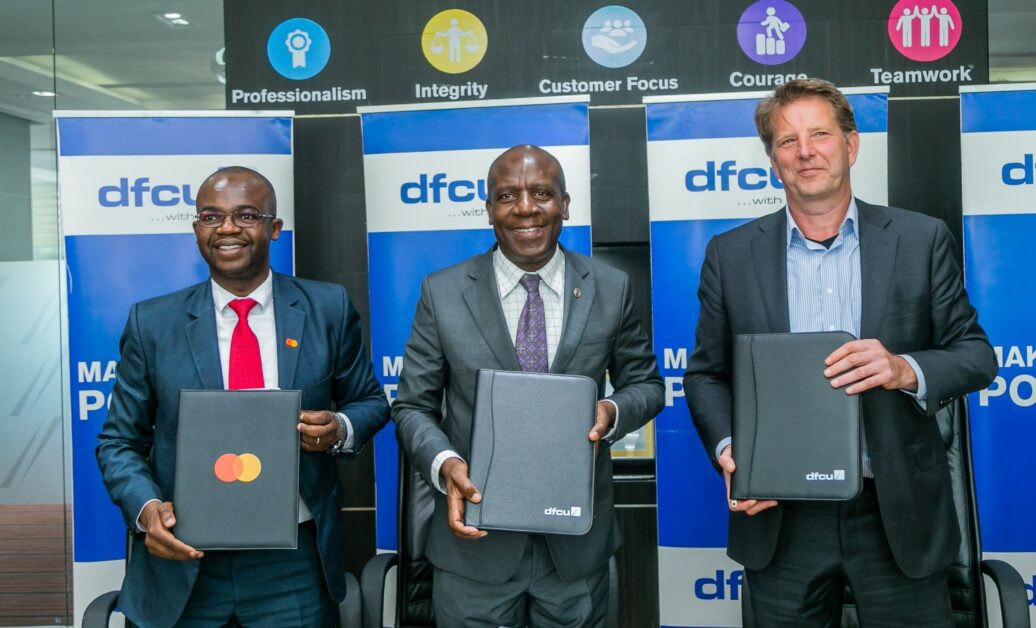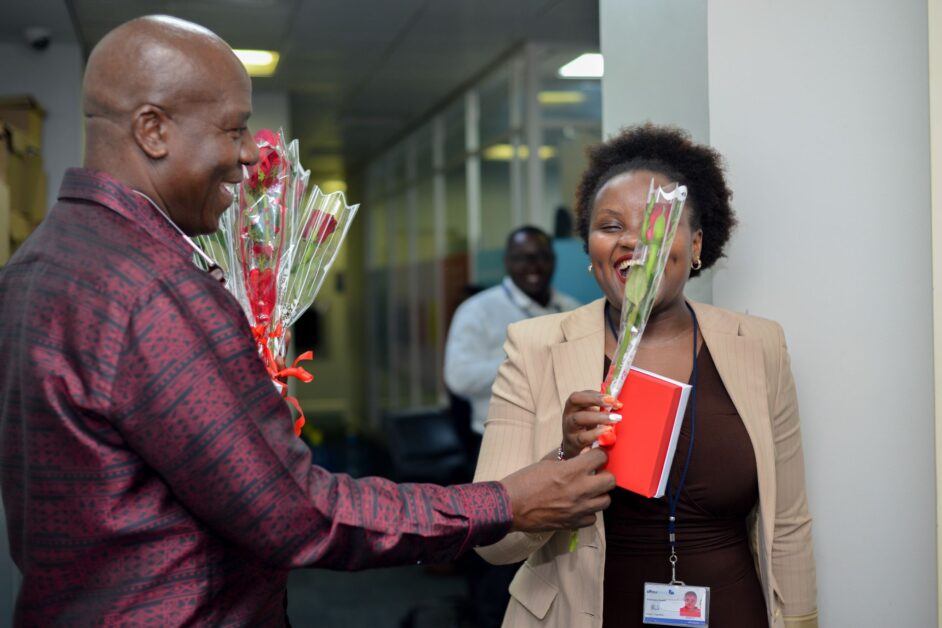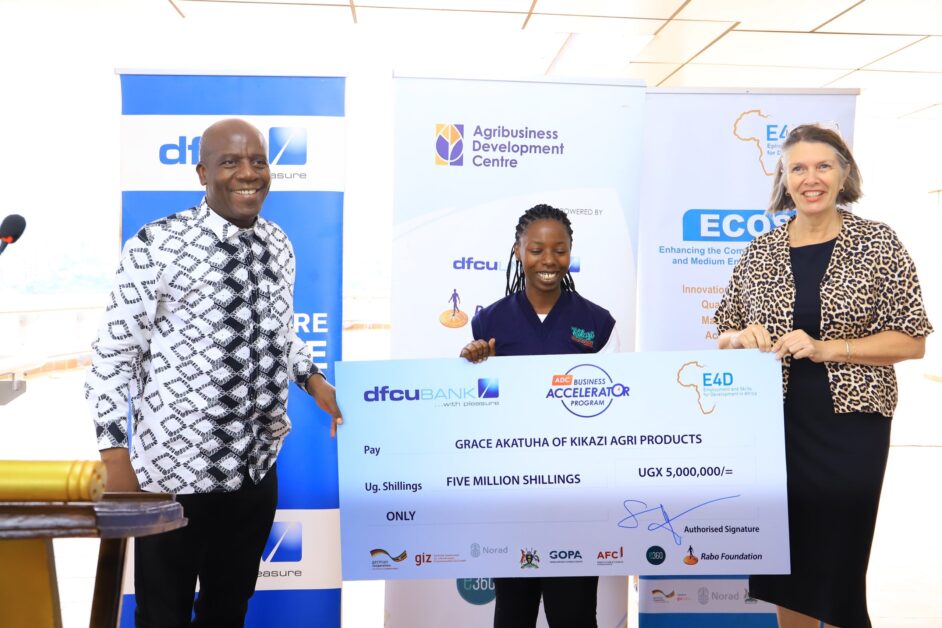“I mean, for us (dfcu Bank), a top three position should really be where we should be going. We should be among the top three banks in the country. We should be able to move into the top three banks in the short run. That is our aspiration and we should be able to see ourselves being able to do that,” Charles Mudiwa, the Chief Executive Officer of Uganda’s dfcu Bank, told media at a working lunch organised by the bank on March 15th 2024 at Golden Tulip Hotel, Kampala.
Mr. Mudiwa who assumed the leadership role of Uganda’s dfcu Bank in April 2023, had called the media to brief them on what he has been up to since he assumed leadership of the listen bank. He also talked about the bank’s upcoming 60th anniversary celebrations.
Responding to a question by one of the journalists, Mr. Mudiwa said that he strongly believes that dfcu Bank has all the right strengths⏤ market knowledge, experience, legacy, track record, the right people, as well as committed, like-minded and solid shareholders⏤ to become a top 3 bank.
What only needs to be done, he said, was to optimally redirect those strengths to where they could create the highest stakeholder return while sticking to the bank’s core purpose of “transforming lives and business in Uganda”. And this is what he says, he has been doing over the last 12 months.
Just to make sure you understand dfcu Bank very well, let us go a little back in time to set the context.
The birth and rise of dfcu Bank as a Domestic Systemically Important Bank
The Development Finance Company of Uganda (dfcu) Limited, the holding company for dfcu Bank Limited, was incorporated in Uganda on the 14th of May 1964. It was started by the Commonwealth Development Corporation (CDC) of the United Kingdom and the Government of Uganda through the Uganda Development Corporation (UDC). Its purpose was to support long-term development projects whose financing needs and risk did not appeal to the then-existing financial commercial lending institutions. Subsequent restructuring saw the International Finance Corporation (IFC) and the German Development Corporation (DEG) invest resulting in an equal stake of 25%.
In 1999, dfcu acquired Uganda Leasing Company and then became dfcu Leasing. In 2000, following the acquisition of Gold Trust Bank, it was renamed dfcu Bank and widened its services to offer universal banking services alongside the pre-existing equity finance; long-term development finance; leasing and working capital finance.
On 18th March 2004, dfcu Limited went public and was listed on the Uganda Securities Exchange on the 14th of October 2004. By this time, CDC had emerged as the majority shareholder with 60%.
In 2013, CDC – at the time managing its stake in the bank through Actis, sold 27.54% to Rabo Development B.V a Dutch multinational bank and 17.48 to Norfund, Norway’s development bank, increasing its stake to 27.5%. CDC retained 15%.
With these new partners, dfcu’s growth accelerated and by 2016 dfcu was Uganda’s 7th largest bank by net profit, the 6th largest bank by deposits, the 5th largest by assets and the 4th largest by lending.
In January 2017 acquired some assets and liabilities of the former Crane Bank and by the end of that year, dfcu became the number 2 bank by assets, deposits and net profits and the No. 3 by lending.

In 2017, following a rights issue by dfcu Limited, CDC’s shareholding was reduced to 9.97%, and in December 2019, it finally sold its remaining stake to Investeringsfonden for Udviklingslande (IFU), a Danish development financial institution.
In 2017 Rabo Development B.V (Rabobank) and Norfinance AS (Norfund) transferred their shares in dfcu to Arise B.V., an investment company based in Cape Town, South Africa. This followed the decision by Norfund, NorFinance A.S., Rabo Development, and FMO (Nederlandse Financierings-Maatschappij voor Ontwikkelingslanden N.V.), to form one investment entity⏤ Arise B.V.
Arise B.V. is one of the biggest investment firms on the African continent with over USD1 billion in assets under management in 33 countries in Africa.
However, shifting market dynamics as well as an aggressive advance by dfcu’s competitors, especially in the top 5 banks league, saw dfcu’s 2017 market share gains shaken. By the end of 2022, dfcu Bank was now the 5th largest by lending, the 6th by assets and deposits and the 11th by profitability.
Mudiwa’s Fired-Up & Ready-To-Go Strategy
To change this trend, at the start of 2023, dfcu Bank’s Board appointed Charles Mudiwa as the bank’s new CEO, starting in April 2024.
This followed the resignation of Mathias Katamba, the bank’s CEO between December 2018 and January 2023.
With him, Mr. Mudiwa, brought to dfcu Bank, over 25 years of banking experience⏤ 20 of those within the Standard Bank Group as CEO of Stanbic Bank Kenya, CEO of Stanbic Bank Zambia and CEO of Standard Bank Malawi. Before that, he was the Director, Mass Markets at Standard Bank South Africa.
According to Stanbic Bank Kenya’s published results, in the 5 years that he led the bank, profitability grew by 111.6% from KES 4.3 billion at the end of 2017 to KES9.1 billion at the end of December 2022- a Compounded Annual Growth Rate (CAGR) of 13%. Deposits grew 84.4%, at a CAGR of 11% from KES153 billion to KES282.1 billion, while lending grew 80.8% at a CAGR of 10%, from KES130.5 billion to KES 236 billion. Total income grew 67.7% at a CAGR of 9% from KES18.6 billion to KES 31.2 billion.
Total assets grew 63% at a CAGR of 8% from KES 239.4 billion to KES390.3 billion.
Mudiwa, who led Stanbic Bank Kenya through the Covid-19 pandemic, through to the end of 2022, was hailed by Kitili Mbathi, the bank’s Chairman for “leading the strategic impetus” of the bank for over 5 years “resulting in a well-positioned, digital, sustainable financial services organisation that has experienced year on year growth”.
“His resolute leadership, technical expertise and sound counsel proved indispensable as we navigated major transitions and context-related challenges,” Kitili further said of Mudiwa’s leadership, in the bank’s 2022 annual report.
It appears, Mudiwa is a good student of Abraham Lincoln, an American lawyer, politician, and statesman, who served as the 16th president of the United States, from 1861 until his assassination in 1865.
One of Abraham Lincoln’s famous statements that has gone on to influence management strategy is “Give me six hours to chop down a tree and I will spend the first four sharpening the axe.”
Mudiwa has spent the greatest part of 2023 reshaping dfcu Bank’s strategy to identify the bank’s core strengths and ensure major wins therein.
“During the year, we refreshed our strategy to adapt to the dynamic shifts in the operating environment and ambitions of our stakeholders. The refreshed strategy dubbed, “Fired-Up” is a rallying call towards achieving our purpose of “Transforming Lives and Businesses in Uganda” and our goal “To sustainably grow Stakeholder value with Innovative Solutions, inclusivity, and Empowered People”,” Mudiwa notes in a stakeholder brief accompanying the 2023 results.
“The purpose of the strategy refresh was to reaffirm our institutional goal, clarify where we play and how we shall win, define our digital and technology priorities and show the value drivers that will enable us to achieve improved financial performance and social economic environmental impact,” Mudiwa adds.

The key 8 sectors the bank has chosen are agriculture, manufacturing, infrastructure & energy, ICT, trade & business, public sector, financial institutions and education and health. These sectors, depending on the size and needs of the clients, have been carved into the Bank’s existing customer segments, namely: Corporate & Institutional Banking, Commercial Banking, Enterprise Banking and Personal Banking.
“We believe that we will see positive changes from implementing ‘Fired Up’, for us, our shareholders, and our customers. We are now more focused than ever on stabilizing and winning market share, reorganising for effectiveness, and enabling transformation through operational efficiency. It’s important to understand that our ‘Fired Up’ strategy is hinged on who we are as an institution – our values and culture and how we uphold them,” he further reassured stakeholders.
“One of the lessons we have learned from Covid-19 is helping our customers to navigate their cash flows by giving them the right level of funding and also structuring their facilities correctly (depending on the sector they are in),” Mudiwa told journalists at the media lunch.
“We have now learned that we have to understand our customers and take a sector approach to respond to the needs of the customers. We have a sector head for each sector, who understands what is happening in that sector, and how to deal with that sector and the issues that are unique to that sector. With climate change, for example, farmers have to deal with a lot more. So we also have to learn how to finance our customers in agriculture in a different way. We’re having to make adjustments,” Mudiwa noted.
Other than a great strategy, Mudiwa is more than convinced that the bank has everything it takes to bring that strategy to life and create shared stakeholder wins.
“We have very strong competencies in our leasing capability, very strong competencies in our agriculture capabilities, very strong competencies in our SACCOs proposition, very strong competencies in our women in businesses, and very strong competencies in our SME businesses. What we have is a bank that is strongly grounded in leasing, strongly grounded in commercial SME lending, but also more importantly, also strongly grounded in agriculture,” Mudiwa affirms, adding: “We do have the customer base”.
The bank, according to Mudiwa, banks 130,000 SMEs; 33,000 SACCOs and last year alone, extended UGX100 billion in credit to women-owned businesses. The bank also enjoys a mutual relationship with these SMEs, SACCOs and women-owned businesses that includes not just credit extension, but a host of several other capacity and skills development as well as business support services.
Dfcu also runs a one-of-a-kind support programme for farmers, in association with ADC- Agribusiness Development Centre, an entity owned by dfcu and Rabobank.
He for example says that the bank recently signed an agreement with MasterCard Foundation and Rabobank, to develop an aptly named “Farm-First Programme, which will allow us to help farmers to give them a market for their produce”.
“In the next five years, we are targeting to grow this to 1.5 million farmers across Uganda who will be able to access the ability to sell programmes; to sell their output,” Mudiwa says, adding that the bank has a rich legacy with especially Ugandan businesses to build onto.
“If you ask the average business person in Uganda, I can bet you any large company which is local in Uganda, dfcu was part of their formation, But we have for some reason not leveraged on it. So we’ve gone through a process of revitalising our strategy; coming through and saying, how do we grow this business? What do we need to do? The whole revitalisation is to now reposition dfcu for growth into the future,” he emphasises.

As of the end of 2023, the bank reported it had 540,000 active customers of whom 28,000 were active borrowers served across 54 branches (the 3rd largest in the industry). Dfcu also revamped its ATM network, deploying 78 deposit-taking ATMs to offer added convenience to our customers. This is supplemented by internet and mobile banking, as well as 2015 bank agents- a 15% increase from the previous year.
Mudiwa however says the bank’s agent banking proposition has had problems in the past and the bank has had to start afresh.
“We have gone through a process of revamping that agency banking platform. Before, we were using an aggregator; it wasn’t working as well as it should have. System stability and reliability were not great. So last year, we decided to completely start afresh and re-do the agency banking platform. We have now finished that work. We finished onboarding our customers on that platform and I think by the end of the year, you will now start to see a lot more stability and effectiveness of our platform and you will start to see the results coming through,” he reiterates.
Stabilising and redirecting the ship- 2023 performance
Even amidst the re-strategising, Mudiwa has had to hit the ground running and stabilise the ship with some positive results. The bank reported that at the end of 2023, the number of active customers grew by 103%, partly driven by participating in the Parish Development Model (PDM)- a government of Uganda development programme. This increase powered a 17% increase in transaction volumes and a 33% uptake of digital banking offerings, especially mobile banking.
Dfcu also reported that it maintained a strong capital position ⏤ core capital ratio improved by 3.2% from 25.6% in 2022 to 28.9% in 2023 and the total capital ratio also improved by 3% from 26.5% in 2022 to 29.5% in 2023 which well above the regulatory limits of 13% for core capital and 15% for total capital.
The Company recorded a 1.5% increase in total interest income from UGX345 billion to UGX350 billion and a 12% increase in non-funded income from UGX86 billion to UGX97 billion due to a significant recovery on the fair value asset, which resulted in a 4% increase in total income for the year from UGX431 billion to UGX449 billion.
The Bank also said that it continued to exercise a cautious approach to credit extension which resulted in a 17.3% reduction in the loan book from UGX1,361.4 billion to UGX1,125.8 billion.
However, the total number of borrowers continued to grow, increasing by 19% as the Bank expanded its credit outreach to more households across the country. The bank also said it intensified efforts to manage credit risk, reducing the impairment of loans and advances to customers by 6% from UGX88 billion to UGX83 billion.
Profit after tax for the bank rose by 11.1% from UGX30.6 billion to UGX34 billion.
However, deposits reduced by 3.8% from UGX2.41 trillion to UGX2.32 trillion.
Total assets also reduced by 2.4% from UGX3.28 trillion to UGX3.20 trillion.
Mudiwa’s Fired-Up A-Team
Every good war strategy needs a great commander-in-chief but equally good frontline commanders.
To lead this strategy Charles Mudiwa has also spent the last 9 months reorganising his leadership team.
In August 2023, Kate Kiiza, the bank’s CFO since 2015 was elevated to the Executive Director and CFO role. She brings to the role over 14 years of experience in senior finance roles, including Financial Controller and Chief Financial Officer at Shell Uganda Limited (now Vivo Energy) and Chief Finance Officer at United Bank for Africa.
Margaret Karume, a seasoned banker with over 30 years of experience, was also recruited as a Chief Credit Officer, bringing with her a rich regional banking experience that includes working for Barclays Bank Kenya (now ABSA Bank) where she was Manager of Corporate Banking, NIC Bank Tanzania (later NCBA Tanzania) where she served in senior roles such as Director Credit Risk before rising to become Managing Director, between January 2019 and June 2022.
Doreen Byaruhanga, another professional banker with a career spanning more than twenty years, was onboarded for the role of Chief Corporate and Institutional Banking Officer. Doreen started her career at Barclays Bank Uganda in 2001 and quickly moved up the ranks to lead the Trade Finance team before moving to Corporate Credit. She then worked at Stanbic Bank Uganda for 11 years as Head of Corporate and Institutional Banking and Head of Vehicle and Asset Finance. In 2022, she joined Equity Bank Uganda as the Head of Corporate, from whence she joined dfcu.

Mudiwa, also tapped on Maryann Wanjiku Michuki for the role of Chief Business Solutions and Marketing Officer. Maryann has over 15 years of experience across several industries including financial services, telco, services, and manufacturing. She started her career at Safaricom Plc, before switching sides to advisory⏤ managing and growing a USD 4 million portfolio of clients including Safaricom, KCB, Equity, EABL and the Elton John Aids Foundation, while she served as General Manager at Squad Digital, a WPP Company. In 2020, Maryann joined Stanbic Bank – Kenya as Head, of Innovation. She additionally worked as an Ag. Head, Brand and Marketing for 9 months in 2022. It is from here that she joined dfcu Bank.
Annette Kiconco, previously the Head of Public Sector Business & Commercial Clients at Stanbic Bank Uganda, has also joined dfcu Bank as the Chief Retail Officer. Annet brings on board 20 years of banking experience – gained from prior experiences with Stanbic Bank, Absa Bank and Orient Bank (now I&M Bank Uganda).
The new team, joins Angelina Namakula-Ofwono, the Chief Legal Officer since October 2019 and Victor Rugeiyamu, the Chief Risk Officer since 2021.
Mudiwa says the rich mix of talent with local and regional experiences blends well with the bank’s glocal character.
“Dfcu Bank is a glocal bank. We have access to the best in the world but at the same time, we have very strong deep-rooted experiences here. So we’re a glocal bank. As we start to grow and reach out, you’ll see a lot more of that impact because we get the best skills in the world, but at the same time, with local relevance and capability to support our local teams and decisions. But more importantly, decisions are all made in Uganda, which I think is very important for us,” Mudiwa firmly says.
60 years and looking to a great future ahead
As the bank clocks 60 years this May 2024, Mudiwa says this is an opportunity to reflect on the past impact “as we look into the next 60 years”.
“As we look into the next 60 years as dfcu, our singular objective is how to transform lives and businesses in Uganda. How do we make businesses grow? What can we do to make local businesses grow? We are proudly Ugandan and would like to see ourselves continue on that trajectory to grow the businesses in Uganda and make them successful but also support young entrepreneurs and their young businesses to have access to the resources, skills and advice to make them grow,” Mudiwa emphasises.
He also speaks of a commitment to “building on our strong foundation and delivering even greater value through future-ready innovations in our products and services, a focus on enhancing customer experience and a dedication to winning market share”.
“We strive to exceed expectations and remain a trusted partner for all your banking needs. We appreciate the continued support from all our customers and stakeholders over the years and we ask you to journey with us as we strive towards the achievement of our purpose to “Transform Lives and Businesses in Uganda,” Mudiwa concludes.
